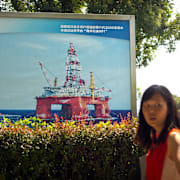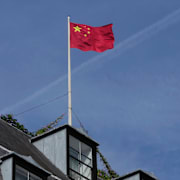
Sydkoreas militär tar ner kinesiska kameror på baser
Sydkoreas militär har nyligen monterat ner 1 300 övervakningskameror efter att en rutinkontroll uppdagat att de tillverkats i Kina, uppger en militärkälla enligt AFP.
Kamerorna har bland annat funnits på militärbaser, bland annat nära den hårt bevakade gränsen till Nordkorea.
De kinesiska kopplingarna ses som ett säkerhetshot men enligt Sydkorea har ingen data faktiskt läckt, rapporterar Yonhap.
bakgrund
Relationen mellan Kina och Sydkorea
Wikipedia (en)
The People's Republic of China (PRC) and the Republic of Korea (South Korea) formally established modern diplomatic relations in August 1992. South Korea was the last Asian country to establish relations with the People's Republic of China. In recent years, China and South Korea have endeavored to boost their strategic and cooperative partnership in numerous sectors, as well as promoting a high level relationship. Trade, tourism and multiculturalism, specifically, have been the most important factors of strengthening two neighbouring countries' cooperative partnership. Despite this, historical, political and cultural disputes have still played several roles on the relations between South Korea and China, especially with China being politically aligned with North Korea.
Both nations have been bound together by a shared history, including an overlap in cuisine, religion, a common language script and legal systems, and kinship ties that reach back thousands of years, especially during the Song and Ming Dynasty, where it shared a close trade and diplomatic relationship with Goryeo and the Joseon Dynasty respectively. The Ming and Joseon emerged after the invasion of the Mongols and shared close Confucian ideals in its society. Furthermore, the Ming had assisted Joseon during Toyotomi Hideyoshi's invasion of Korea, in which the Wanli Emperor sent a total of 221,500 troops. Joseon had also used Classical Chinese as a common script alongside Korean, and its central government was modelled after the Chinese system.
Contemporary relations between China and South Korea are characterized by extensive trading and economic relations. China is by far South Korea's largest trading partner, with China importing goods worth $160 billion from South Korea in 2018, which comprised 26% of South Korea's total exports. 21% of South Korea's imports also came from China, worth $107 billion in 2018. In 2015, China and South Korea signed the bilateral China–South Korea Free Trade Agreement which aimed to boost annual bilateral trade to over $300 billion, while lifting both countries' GDP. In November 2020, China and South Korea, along with 13 other Asia-Pacific nations, signed the Regional Comprehensive Economic Partnership, the largest free-trade agreement in history which covers 30% of the world's population and economic output. China, South Korea and Japan are also engaged in long-running negotiations for a trilateral free-trade agreement which would further integrate their economies.
Relations deteriorated considerably after South Korea announced its intentions to deploy THAAD, a move that China strongly opposed. China imposed an unofficial boycott on South Korea in an attempt to stop them from deploying the missile system. However, at the end of October 2017, the two countries ended the 1-year-long diplomatic dispute and have been working swiftly to get their relationship back on track since, strengthening exchanges and cooperation between each other, creating harmony of interests, and agreed to resume exchanges and cooperation in all areas. All economic and cultural bans from China towards South Korea were also lifted as a result, with political and security cooperation, businesses and cultural exchanges between the two countries getting back to healthy state.
Upon the relationship's resumption, China and South Korea have been organizing presidential and governmental visits, working together on the Korean Peninsula, assisting with the development of other countries, and cooperating in numerous areas.
Omni är politiskt obundna och oberoende. Vi strävar efter att ge fler perspektiv på nyheterna. Har du frågor eller synpunkter kring vår rapportering? Kontakta redaktionen



